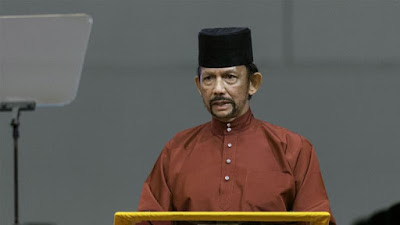Brunei halts plan to punish gay sex with death by stoning
 |
| Aljazeera 05 May 2019 |
Following an international uproar, sultan says Brunei will not enforce death penalty for gay sex, adultery and rape.
Brunei‘s sultan has extended a moratorium on the death penalty to new laws prohibiting gay sex and adultery after a global backlash against the punishments.
The announcement on Sunday was Sultan Hassanal Bolkiah’s first public comments on the new penal code since it fully entered into force last month.
The laws, based on Brunei’s interpretation of Islamic laws introduced stoning to death for sodomy, rape and adultery, amputation of hands and feet for thieves, and public flogging for abortion.
The controversial measures, which the UN condemned as “cruel and inhuman”, prompted celebrities and rights groups to seek a boycott on hotels owned by the sultan, including the Dorchester in London and the Beverley Hills Hotel in Los Angeles.
Several multinational companies also put a ban on staff using the sultan’s hotels, while some travel companies stopped promoting Brunei as a tourist destination.
Bolkiah, in a televised address before the start of the Muslim holy month of Ramadan, said he was “aware that there are many questions and misperceptions with regard to the implementation” of the new penal code.
“As evident for more than two decades, we have practised a de facto moratorium on the execution of death penalty for cases under the common law,” he said.
“This will also be applied to cases under the [Islamic penal code], which provides a wider scope for remission.”
Convention against torture
Muslim-majority Brunei operates a dual-track legal system with civil courts operating alongside Islamic law courts that handle issues such as marital and inheritance cases.
Some crimes already command the death penalty in Brunei, including premeditated murder and drug trafficking, but no executions have been carried out since the 1990s.
The sultan’s comments suggest this will not change with the introduction of the new harsh laws.
Bolkiah – one of the world’s wealthiest men – also vowed Brunei would ratify the UN convention against torture which it signed several years ago.
The sultan first announced plans for the Islamic penal code in 2013.
The first section was introduced in 2014 and included less stringent penalties, such as fines or jail terms for offences including indecent behaviour or skipping Friday prayers.
But the introduction of the harsher punishments in the former British protectorate of about 400,000 people was repeatedly delayed after they sparked criticism.
The sultan’s office released an official English translation of his speech, which is not common practice.
He said the aim of both the common law and the Islamic law were “to ensure peace and harmony of the country”.
“They are also crucial in protecting the morality and decency of the country as well as the privacy of individuals,” he added.


